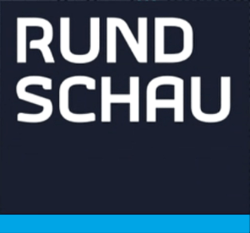Rundschau
Rundschau (Round Show) is a news program produced and airing on BR Fernsehen. It started airing on October 1, 1979. Originally intended as a regional-oriented program, Rundschau later include reports from around Germany which also appeal to viewers in other states. Rundschau reports updates from Bavaria, Germany and the world.
| Rundschau | |
|---|---|
 | |
| Also known as | Rundschau Magazin (21:45) Rundschau Nacht (late-night) Rundschau in 100 Sekunden (short bulletins) |
| Presented by | Various |
| Country of origin | Germany |
| Original language(s) | German |
| Production | |
| Producer(s) | Bayerischer Rundfunk |
| Running time | Main edition: 30 minutes Afternoon edition: 15 minutes Rundschau Magazin: 15 minutes Rundschau Nacht: 10 minutes |
| Release | |
| Original network | BR Fernsehen |
| Original release | 1 October 1979 – present |
History
Initially Rundschau only aired in the evening; later on, an afternoon edition was introduced. In 1991 a sister program, Rundschau Magazin (Rundschau Magazine), started airing; it is similar to Das Erste's Tagesthemen and ZDF's heute journal. A late-night edition, Rundschau Nacht (Rundschau Night), started in 1996 as a new format. It was axed at the end of 2004, but was reinstated from October 2007, having remained on air since. Since 2009, a 100-second news summary edition called Rundschau News in 100 Sekunden (Rundschau News in 100 seconds) has been broadcast, which is also available as a smartphone app, also including specific variations such as Bavaria and the economy. Rundschau Extra concentrates on particularly important current events, and is generally added to the schedule at short notice.
In spring 2012, a cross-media format known as the Rundshow was trialed for four weeks: this was a version of the Rundschau with a strong focus on audience participation, and was presented by Richard Gutjahr with varying co-hosts.
For decades, the main edition of the Rundschau was broadcast at 6:45pm on BR Fernsehen; however, as part of a major programming overhaul, from 11 April 2016 it was extended from 15 to 30 minutes and moved to start at 6:30pm. As part of this revamp, Rundschau also received a new format, a new studio and a new on-air design. From 7 August 2017, BR put another new studio in operation, with a green screen and robotic cameras; the design of the Rundschau remained unchanged.[1]
Programmes
Rundschau
Afternoon edition:
- 4:00pm to 4:15pm (daily)
Main edition:
- 6:30pm to 7:00pm (Monday to Saturday)
- 6:30pm to 6:45pm (Sundays and public holidays)
Main edition presenters:
- Stefan Scheider (since 1996)
- Ursula Heller (since April 2016)
- Petra Schwarzenberg (since December 2012)
Afternoon presenters/main edition co-presenters:
- Susanne Franke (since 1993)
- Sophie von Puttkamer (since April 2016)
Rundschau Magazin
- 9:45pm to 10:00pm (Monday to Saturday)
- 11:00pm to 11:15pm (Sundays, depending on Bundesliga matches)
Presenters:
- Anouschka Horn (since 1997)
- Florian Fischer-Fabian (since October 2007)
- Till Nassif (since May 2016)
Rundschau Nacht
Rundschau Nacht is a ten-minute bulletin broadcast on weekdays, live on BR's website at 11:30pm, and on BR Fernsehen between 11:45pm and 2:00am the next morning, depending on the length of the programmes shown beforehand.[2]
Presenters:
- Richard Gutjahr (since 2000)
- Sophie von Puttkamer (since March 2012)
- Christina Wolf (since September 2016)
Trivia
- On 25 July 1988, ARD's top rating news program, Tagesschau, produced by Norddeutscher Rundfunk in Hamburg, was to be cancelled due to a warning strike organized by the broadcasting union RFFU. This would have been the first time in the history of the ARD that the Tagesschau was not broadcast. It helped out for Tagesschau as a substitute program and in this way was broadcast nationwide.[3]